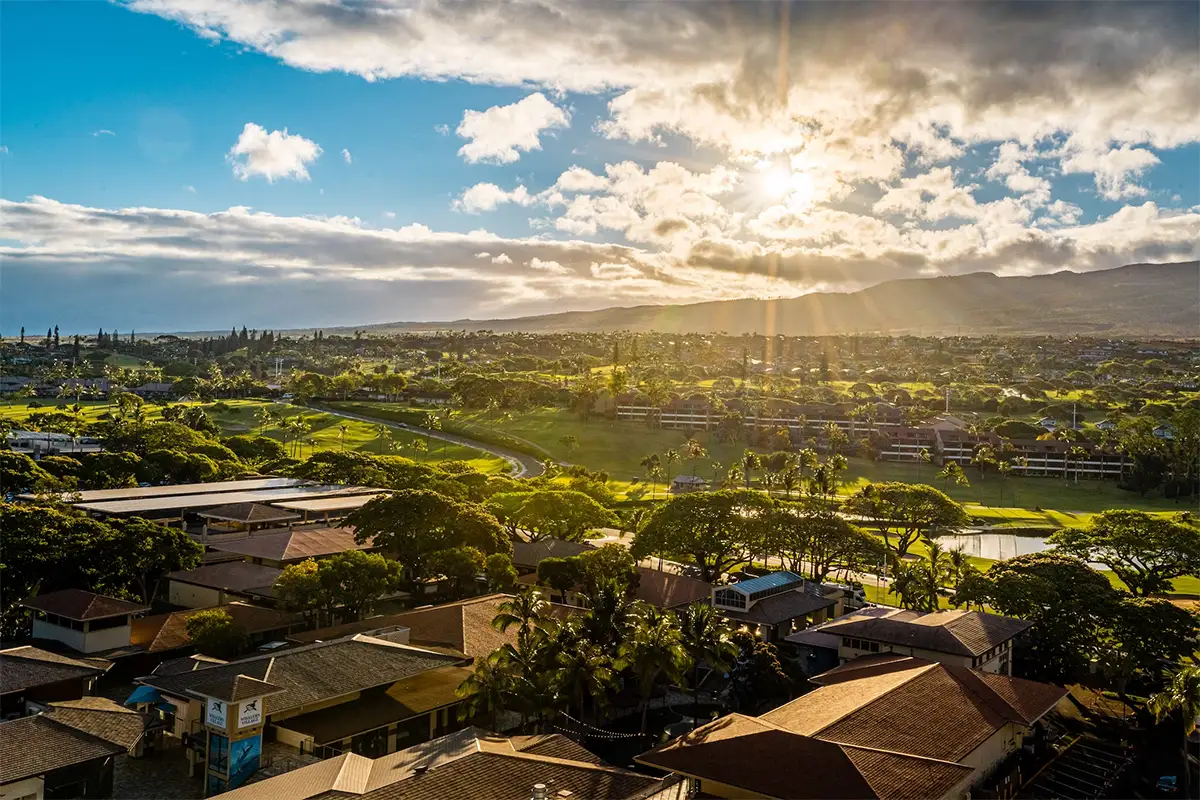 Hawai'i Journalism Initiative
Hawai'i Journalism InitiativeMaui nonprofit feeds local families, puts displaced residents back to work

KAHULUI — Nearly a year after losing her jobs at two restaurants that burned down in the Lahaina fire, Heidi Stone is serving food to the community again.
Stone works out of the Living Pono Project’s distribution hub in Kahului, a brightly lit room stacked full of pallets of bread, shelves of dry goods and crates of robust tomatoes and hefty heads of lettuce. She stays busy during the hub’s peak morning hours on Wednesdays, helping customers or restocking shelves as displaced Lahaina families load up on groceries.
HJI Weekly Newsletter
Get more stories like these delivered straight to your inbox. Sign up for the Hawai‘i Journalism Initiative's weekly newsletter:
The job gives her something else to set her mind on after months of unemployment and displacement from her family’s still-standing but uninhabitable home in Lahaina.
“It was important to get out of the house for my sanity and my mental health … and I get to see so many people from the community that it’s nice,” Stone said. “Because for awhile, I was like, I don’t even want to go anywhere.”
Stone is among the dozens of people employed through a program that puts displaced workers in temporary jobs to help with Maui’s recovery from the Aug. 8 wildfires in Lahaina and Upcountry. The program is 100 percent federally funded through a $12.7 million Maui Disaster Recovery National Dislocated Worker Grant to Maui Economic Opportunity.
As of Monday, the program had 41 active host sites and 149 active participants, according to MEO CEO Debbie Cabebe. The program is providing up to 300 temporary jobs to help with debris cleanup and wildfire recovery and/or provide humanitarian services such as distribution of food and clothing.
The Living Pono Project is one of the participating organizations and is not only putting people back to work but also connecting local families with fresh produce from farmers whose incomes took a hit after the fires.
The nonprofit started as an effort to help at-risk youth and people with disabilities get into sustainability, agriculture and conservation, explained Makale‘a Ane, climate and resilience director for the organization. They work with a group of farmers on about 300 acres of land just past the Maui Tropical Plantation, growing native crops and raising pigs, chickens and sheep.
While handing out cans of Spam and packets of saimin shortly after the fires, Ane and other farmers wanted to find ways to get fresher, healthier foods to families.
“After the fires, we kind of pivoted and took the work that we’re doing on the farm and said, let’s feed our people in this way,” Ane said last month.
The Living Pono Project got a grant to buy produce from 75 farmers who lost income due to the fires and give that produce for free to people who lost their homes or jobs. The initial grant covered food baskets for 100 families, with an average cost of $40 per basket. Demand filled up so quickly that they secured a second grant and more partnerships, and expanded to servicing at least 500 families, Ane said.
“It just keeps growing as people are kicked out of the hotels, moving to this side, so it was really good to be based in Central Maui,” said Ane, pointing out that they can serve Lahaina families living in the area as well as people impacted by the Upcountry fires.

The Living Pono Project also started employing people through the dislocated worker program. Some work at the distribution hub, and Ane said they’re also looking for farm workers who can carry 50 pounds and are good with people and animals.
“People that are compassionate and want to do service work and feed our community and can work with people with disabilities,” Ane said.
The organization’s hub opens every Wednesday from 9 a.m. to 6 p.m. in Suite 110 of the office building at 95 Lono Ave. where Clinical Labs is also located. Each week, Stone goes shopping at the Maui Food Bank, picking up essentials like bread, milk and proteins that can supplement the fresh produce that the Living Pono Project gets from farmers. A steady stream of people, many of them familiar faces from Lahaina, pass through loading up on groceries.
Stone, who used to work as a server at Sale Pepe and Papa‘aina at the Pioneer Inn in Lahaina, was unemployed for several months before she got the job with Living Pono. She likes the access to fresh local foods like poi and eggs, and is glad to be paid weekly and put the money toward bills. She and her husband have three kids ages 19, 13 and 8. The younger two attended schools in Central Maui after the fire forced them to relocate to Wailuku. Eventually, she says, they want to go back to Lahaina.
“My husband wants to go back because he works on that side. It’s like the drive for him is treacherous. … I can stay on this side and work over here and the kids go to school over here,” Stone said. “But my middle (child) already wants to go back to Hawaiian immersion on that side. I don’t know, we have summer to decide.”
Fourth-generation Lahaina resident Coreen Serrano, who’s been living in Wailuku since losing her home in the fire, described the workers at the hub as “helpers from God.”
Serrano carried bags of fresh produce out to the old white Toyota Corolla that once belonged to her dad and kept her husband and their neighbor alive in the parking lot of the burning Lahaina United Methodist Church on the night of the fire. She can’t bring herself to give the old car up — it’s a treasured reminder of her late father after so many of her parents’ belongings and the family’s home were destroyed in the fire.
“It’s been hard trying to maneuver, trying to navigate our new normal, so to say,” Serrano said during a visit to the hub last month. “What is our new normal, you know? When you have to start from nothing. I mean, we lost everything. I didn’t even have a vegetable peeler.”
The program is also a boost to local families with kids. While Kahului resident Lahela Vierra didn’t lose her home, her work with a delivery company was impacted by the fire. With three kids and relatives who often pass through her home, Vierra supplements her pantry with fresh groceries from the hub.
“My ‘ohana and I are blessed to even be a part of this,” said Vierra, who came to the hub last month with her 5-year-old daughter ‘Oili‘i. “Everybody’s income was fluctuating due to the fire and a lot of other circumstances we were going through. … The grocery prices are ridiculous and having kids, and in the summer, that’s a big mix right now financially.”

HELP WANTED
For Antonio Paulino, the fire was a double blow — taking both his home just off Shaw Street and his job at Cool Cat Cafe where he did everything from whipping up milkshakes to handling T-shirt sales. The 2022 Lahainaluna High School graduate has had a tough time trying to get unemployment benefits since then.
“We’ve been struggling a bit financially, especially since my sister is in college in Arizona,” Paulino said. “So it’s actually one of the reasons I’m here. I know I need to get a job soon so I can start paying for flight school myself.”
Paulino said “a lot of people are hiring, but it doesn’t seem like they’re hiring.” He’s applied for multiple jobs “and they almost never call me back.”
“It’s hard without the experience,” his dad, Paul Paulino, chimed in.
Father and son stopped by a job fair hosted by MEO and its contractor, Employers’ Options, last month to check out some of the organizations offering positions through the displaced worker program.
According to MEO, program participants have to have been living on Maui at the time of the wildfires on Aug. 8 and meet one of the following criteria:
- Individuals temporarily or permanently laid off as a consequence of the wildfires.
- Dislocated workers who were laid off for other reasons.
- Unemployed four weeks.
- Self-employed individuals who became unemployed or significantly underemployed as a result of the wildfires.
The job categories covered under the program include office assistant ($20.50 per hour), humanitarian assistant ($23 per hour), laborer ($24.50 per hour), administrative assistant ($26 per hour) and crew leader ($27 per hour). Participants are paid weekly for up to 12 months or 2,080 work hours, whichever comes first.
So far, the top five employing organizations are the Council for Native Hawaiian Advancement with 14 workers, S-Turns Community Donation Hub with 12, Living Way Church with 11, Hawai’i Farmers Union United (Napili Noho) with 10 and Maui Rapid Response with 10.
Chase Nomura, workforce solutions adviser for Employers Options, said at the job fair that the program allows people to get back on their feet while also helping their own community.
“It is to get people into a position where they can recover somewhat from the disaster in order to get things moving on their end. And it’s been rough because ideally before people get into the workforce, they have to have stable housing, and that’s a whole other bag of worms to get into,” Nomura said.
Cabebe said that MEO helps participants find regular jobs once their time in the displaced worker program ends. Maui County is also providing $2 million to help cover roughly 50 positions for another 12 months, as well as workers who didn’t meet certain federal requirements that don’t apply to the county.
“I’m grateful that the state had the foresight to go after the federal funding very quickly and stand this program up in a very short time to support folks that were doing the humanitarian work and the recovery work,” Cabebe said. “I think that’s important and I know that it’s made a big difference in a lot of people’s lives, and I’m grateful for that and of course grateful for the county for continuing to support this project.”
The program is continuing to take applications at www.meoinc.org/maui-disaster-recovery-national-dislocated-worker-grant/. For more information, email ndwg@meoinc.org or call (808) 867-0460.





